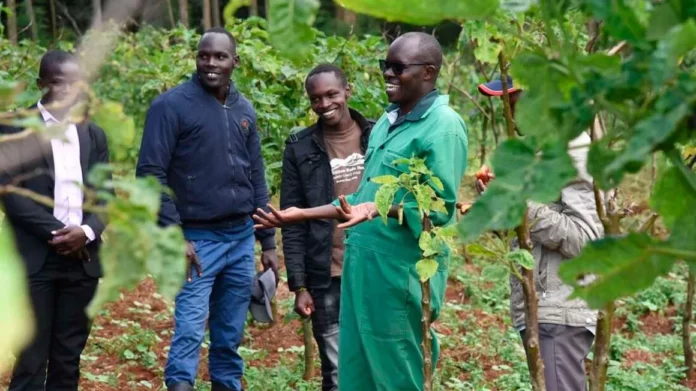Nicholas Kipchirchir is a graduate of Environmental and Biosystems engineering.
Mr. Kipchirchir had a promising career as the technical and operations manager at Enviroserve Kenya, a company specialising in electronic waste management.
He was earning a handsome salary of over Sh. 260,000 from his graduate job.
But Kipchirchir felt that the traditional white-collar job was not his calling. He decided to quit his job and venture into agribusiness. Imagine the shock.
His family was sceptical of his idea for the shift. They all assumed he had got it all wrong. However, his unwavering determination has paid off several years down the line.
Today, six years later, the 38-year-old runs a thriving agribusiness and is an employer in his own right.
“Many people, including my wife and parents, did not expect me to resign from a well-paying job and undertake such a risky business where everything is determined by market forces of demand and supply, but look at where I am now,” he cheerfully says.
According to Kipchirchir, his trip to South Africa ignited his passion for agriculture. He had been sent there on an assignment in 2017.
“I realized there was a big opportunity in agribusiness, especially mixed farming while on an assignment in South Africa in 2017. I visited several farms where I installed boreholes for irrigated crop production and saw an opportunity which could be replicated in Kenya,” he says.
However, Kipchirchir faced challenges at the beginning of his agribusiness journey. He needed startup capital and additional funds for unforeseen emergencies like many entrepreneurs.
“The advantage is I had land, three acres. But later, I had to lease to expand the acreage and accommodate more food crops, poultry, dairy cattle under zero-grazing, sheep, and bees, among other micro-investments, to create a solid base for a living,” he adds.
Initially, Kipchirchir chose to stay employed for a period of two years. He had to make significant sacrifices due to the low returns he was getting.
“If you want to realise a profit, you should be ready to take a risk and that is how I managed to concentrate fully on my farm activities.”
His success in agriculture began with dairy farming, where he owned four heifers that were able to produce an impressive average of 100 litres of milk per day.
Kipchirchir planned to venture into zero grazing. Despite the high initial capital required, he was convinced that the potential returns would be appealing.
This is because of the consistent demand for milk and its by-products. To accomplish this, he would need to do proper animal husbandry.
The business started taking an exponential curve, and soon, he increased the dairy cows from four to seven. To reduce costs, he leased 10 acres of land and planted maize which he used to make animal feeds.
In addition, he has expanded his operations to include sheep rearing, with an annual sale of approximately 15 sheep, each fetching about Sh8,000, which translates to a yearly income of Sh. 120,000.
“The good thing with agribusiness, you are your own boss and you can diversify in response to market forces, unlike in white-collar jobs where you strict yourself to an area of specialisation,” he noted.
READ: How I make millions from mixed farming after quitting my bank job
Furthermore, he keeps 60 improved kienyeji layers that produce 60 eggs daily, which generates approximately Sh. 20,000 per month.
He also owns seven top-bar beehives that yield 10 kilograms of honey every three months, resulting in an average income of Sh. 60,000.
Nicholas Kipchirchir notes that in mixed farming, one cannot rely on a single source of income. To remedy that, he charges individuals Sh. 1,000 each for 2 hour farm visit sessions.
In a month, he can get between 10 and 15 visitors. This is additional income he’d be getting unlike in employment.
Tree tomato farming is also a part of Mr. Kipchirchir’s diversified portfolio. He has devoted an entire acre of land to cultivating the tomatoes.
Because the unpredictable weather patterns can lead to irregular yields, Kipchirchir has installed an irrigation system to ensure consistent production.
Additionally, Kipchirchir has ventured into avocado farming and planted 10 trees of the Hass and Fuerte varieties under drip irrigation.
As a parting shot, Kipchirchir advice youth planning to venture into agribusiness to be disciplined, focused and have the desire to succeed, just like any other business.








